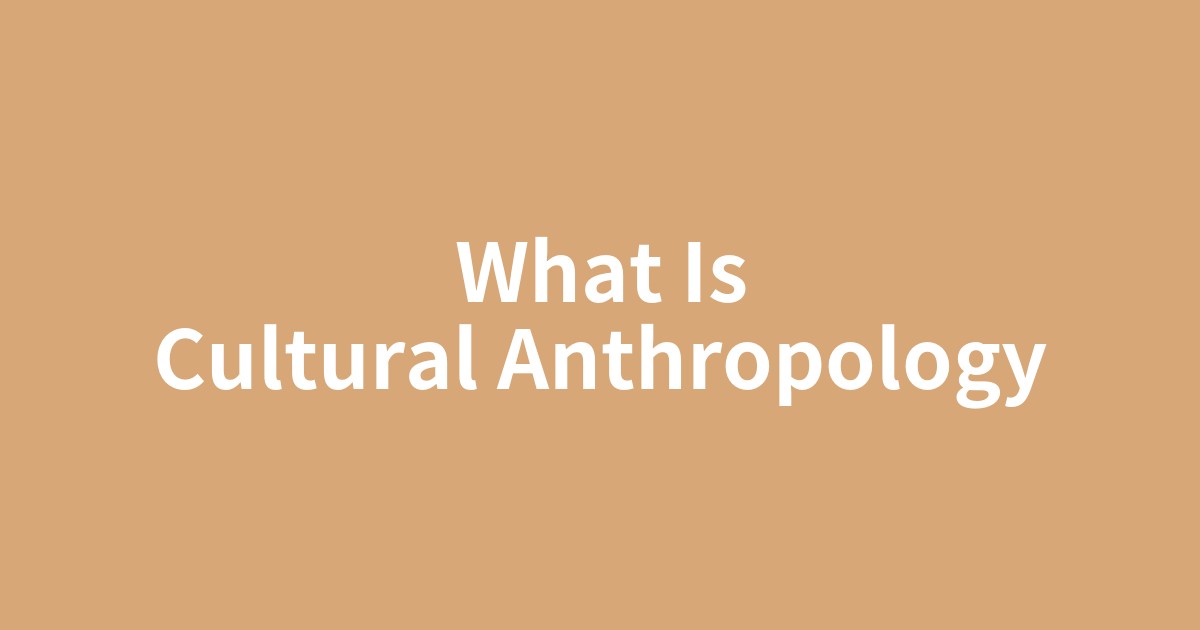このページは、歴史や文化の物語を楽しみながら、その文脈の中で重要な英単語を自然に学ぶための学習コンテンツです。各セクションの下にあるボタンで、いつでも日本語と英語を切り替えることができます。背景知識を日本語で学んだ後、英語の本文を読むことで、より深い理解と語彙力の向上を目指します。

「当たり前」は当たり前ではない。フィールドワークを通して、異文化をその内側から理解し、自文化を相対化する、文化人類学のperspective(視点)。
この記事で抑えるべきポイント
- ✓文化人類学の基本姿勢は、自文化の価値基準で他者を判断しない「文化相対主義」であること。
- ✓研究者が現地に長期滞在し、生活を共にしながら調査する「フィールドワーク」が、文化人類学の最も特徴的な研究手法であること。
- ✓異文化という「鏡」を通して、自分たちの社会の「当たり前」を客観的に見つめ直す(自文化の相対化)視点が得られること。
- ✓文化を宗教・経済・政治といった要素に分解せず、相互に関連した一つの「全体」として捉える全体論的(ホリスティック)なアプローチの重要性。
文化人類学への招待
なぜ日本では、初対面の人に深々とお辞儀をするのでしょうか。なぜ私たちは、器用に箸を使って食事をするのでしょう。これらは私たちにとってごく自然な振る舞いですが、一歩国外に出れば、それは数ある習慣の一つに過ぎません。このような、特定の社会集団が共有する行動様式や価値観の総体を「文化(culture)」と呼びます。そして、世界に無数に存在する文化の多様性を、その内側から深く理解しようと試みる学問こそが「文化人類学」なのです。この学問は、私たちを当たり前の世界から解き放ち、知的好奇心を満たす旅へと誘います。
An Invitation to Cultural Anthropology
Why do people in Japan bow deeply when meeting someone for the first time? Why do we skillfully use chopsticks to eat? While these behaviors are perfectly natural to us, once we step outside our country, they are but one of many customs. The total system of behaviors and values shared by a specific social group is called "culture." The academic discipline that attempts to deeply understand the diversity of countless cultures from within is "cultural anthropology." This field invites us on a journey that frees us from our world of assumptions and satisfies our intellectual curiosity.
「文化」に優劣はない ― 文化相対主義という大原則
文化人類学を学ぶ上で、まず心に刻むべき大原則があります。それが「文化相対主義」という考え方です。これは、どんな文化もそれ自体に価値があり、外部の基準、特に自分たちの文化の価値基準で優劣を判断すべきではない、という姿勢を指します。この対極にあるのが、自らの文化を最高のものとみなし、他者をその基準で評価する「自文化中心主義」です。文化人類学は、文化に「優劣」はなく「違い」があるだけだと考え、その背景にある論理を尊重します。世界の「多様性(diversity)」を真に理解するためには、この公平な眼差しが不可欠なのです。
No "Superior" Culture: The Fundamental Principle of Cultural Relativism
When studying cultural anthropology, there is a fundamental principle to always keep in mind: cultural relativism. This is the stance that every culture has its own intrinsic worth and should not be judged by external standards, especially the values of one's own culture. The opposite of this is ethnocentrism, which regards one's own culture as superior and evaluates others by its standards. Cultural anthropology posits that there is no superiority or inferiority in cultures, only differences, and respects the logic behind them. This impartial view is essential for truly understanding the world's "diversity."
机上ではなく、現場へ ― フィールドワークという独自の手法
文化人類学が他の学問と一線を画す最大の特徴は、その研究手法にあります。それが「フィールドワーク」と呼ばれる、長期間の現地調査です。研究者は書斎にこもるのではなく、調査対象となるコミュニティに自ら赴き、そこに暮らす人々と生活を共にします。この「参与観察」を通じて、書物やデータだけでは決して見えてこない、人々の生きた実践や感情の機微を肌で感じ取るのです。例えば、結婚式や葬式といった社会的な「儀礼(ritual)」に参加することで、その社会が何を大切にし、世界をどのように捉えているのかが、より深く理解できるのです。
To the Field, Not the Desk: The Unique Method of Fieldwork
The greatest feature that distinguishes cultural anthropology from other disciplines is its research method. This is called "fieldwork," which involves long-term on-site research. Researchers do not confine themselves to their studies but go to the communities they are studying and live alongside the people there. Through this "participant observation," they experience firsthand the living practices and emotional subtleties of people that can never be seen from books or data alone. For example, by participating in a social "ritual" such as a wedding or a funeral, one can gain a deeper understanding of what that society values and how it perceives the world.
他者を知り、自己を知る ― 異文化は自らを映す「鏡」
異文化を学ぶことは、単に遠い土地の珍しい習慣を知るだけにとどまりません。その究極の目的の一つは、異文化という「鏡」を通して、私たち自身の社会や文化を客観的に見つめ直すことにあります。例えば、ある社会の複雑な贈与交換の習慣を学ぶと、私たちが年末に行う「お歳暮」という慣習が、単なる贈り物以上の、社会的な関係性を維持するための重要な意味を持っていることに気づかされるかもしれません。このように、文化人類学は私たちに新しい「視点(perspective)」を与え、自明だと思っていた世界の姿を、より豊かで多層的なものとして見せてくれるのです。
Knowing Others, Knowing Oneself: Foreign Cultures as a "Mirror"
Learning about other cultures is not merely about discovering unusual customs in distant lands. One of its ultimate goals is to look back objectively at our own society and culture through the "mirror" of a foreign culture. For instance, learning about a society's complex gift-exchange customs might make us realize that our year-end gift-giving tradition of "oseibo" holds a significant meaning beyond simple presents, serving to maintain social relationships. In this way, cultural anthropology provides us with a new "perspective," revealing the world we took for granted as something richer and more multi-layered.
多様化する世界を生きるための視座
文化人類学とは、文化相対主義の立場から、フィールドワークを通じて異文化を体験的に理解し、その学びを鏡として自らの「当たり前」を問い直す、知的な探求の旅と言えるでしょう。この学問は「人類学(anthropology)」という大きな枠組みの中で、人間とは何か、社会とは何かという根源的な問いに、文化という切り口から迫ります。グローバル化が加速し、多様な価値観を持つ人々と共に生きることが避けられない現代において、他者を尊重し、自らを客観視する文化人類学の視座は、私たちにとって不可欠な羅針盤となるはずです。
A Viewpoint for Living in a Diversifying World
Cultural anthropology can be described as an intellectual quest to experientially understand other cultures through fieldwork from a standpoint of cultural relativism, and to use that learning as a mirror to question our own "common sense." Within the larger framework of "anthropology," this discipline approaches the fundamental questions of what it means to be human and what constitutes a society from the angle of culture. In our modern era, where globalization is accelerating and living with people of diverse values is inevitable, the viewpoint of cultural anthropology—which respects others and allows us to see ourselves objectively—is an indispensable compass for us all.
テーマを理解する重要単語
culture
本記事の主題そのものである最重要単語です。「特定の社会集団が共有する行動様式や価値観の総体」という定義を理解することが、文化人類学の第一歩となります。この単語を軸に、多様性や相対主義といった概念が展開されていきます。
文脈での用例:
I am interested in learning about Japanese culture, especially its food and traditions.
私は日本文化、特にその食事や伝統について学ぶことに興味があります。
ritual
フィールドワークで深く理解できる事柄の具体例として、結婚式や葬式といった社会的な「儀礼」が挙げられています。この単語は、ある社会が何を大切にし、世界をどう捉えているかという価値観が凝縮された文化的な実践を指します。
文脈での用例:
Graduation is an important ritual for students.
卒業式は学生にとって重要な儀式です。
indispensable
記事の結論部分で、文化人類学の視座が現代社会において「不可欠な羅針盤」であると力強く主張するために使われています。この単語が持つ「絶対必要」という強いニュアンスが、筆者のメッセージの重要性を際立たせています。
文脈での用例:
The Sepoys were indispensable for the Company to maintain its control over India.
セポイは、会社がインドでの支配を維持するために不可欠な存在でした。
perspective
文化人類学を学ぶことの最終的な意義を示す言葉です。異文化という鏡を通して自らを見つめ直すことで、新しい「視点」が得られると述べられています。当たり前だと思っていた世界を、より豊かで多層的に見るための鍵となります。
文脈での用例:
Try to see the issue from a different perspective.
その問題を異なる視点から見てみなさい。
diversity
文化人類学が探求する核心的なテーマです。この記事では、世界に無数に存在する文化の「多様性」を、優劣をつけずに理解することの重要性が説かれています。グローバル社会を生きる上で欠かせない、基本的な価値観を示す言葉です。
文脈での用例:
The theory struggled to explain the diversity of life on Earth.
その理論は、地球上の生命の多様性を説明するのに苦労しました。
anthropology
本記事で紹介される「文化人類学(cultural anthropology)」が属する、より大きな学問分野です。この記事の最後で、文化人類学が「人類学」という枠組みの中で、人間とは何かという根源的な問いに迫る学問だと位置づけられています。
文脈での用例:
She is studying social anthropology at the University of Cambridge.
彼女はケンブリッジ大学で社会人類学を学んでいます。
intrinsic
文化相対主義を定義する上で「本来の価値(intrinsic worth)」という表現で使われています。どんな文化も、外部の基準とは無関係に、それ自体に固有の価値を持っているという、文化人類学の根幹をなす思想を的確に表す単語です。
文脈での用例:
The intrinsic value of a handmade craft is often higher than its price.
手作りの工芸品の本質的な価値は、しばしばその価格よりも高いです。
objective
形容詞として「客観的に」という意味で、異文化学習の目的を説明するために使われています。他者という鏡を通して自文化を「客観的に見つめ直す」ことが、自己理解につながるという記事の主張の核心をなす重要な概念です。
文脈での用例:
We need to make an objective decision based on the facts.
私たちは事実に基づいて客観的な決定を下す必要がある。
relativism
「文化相対主義(cultural relativism)」として登場する、文化人類学の「大原則」を構成する単語です。どんな文化もそれ自体の価値基準で理解すべきであり、外部の物差しで優劣を判断すべきではない、という姿勢を指します。
文脈での用例:
His philosophy is known as relativism, which denies any absolute truths.
彼の哲学は、いかなる絶対的真理をも否定する相対主義として知られています。
ethnocentrism
文化相対主義の対極にある概念として紹介されています。自らの文化を最高とみなし、他者をその基準で評価する考え方を指します。この単語を知ることで、文化人類学がなぜ公平な眼差しを不可欠とするのかが明確に理解できます。
文脈での用例:
It is important to avoid ethnocentrism when studying other cultures.
他の文化を研究する際には、自文化中心主義を避けることが重要です。
fieldwork
文化人類学を他の学問と一線を画す「独自の研究手法」として強調されています。研究者が書斎にこもらず、調査対象のコミュニティに赴いて生活を共にする長期間の現地調査を指し、この学問の体験的な性質を象徴する言葉です。
文脈での用例:
The biologist spent two years in the Amazon doing fieldwork on rare species of frogs.
その生物学者は、希少なカエルの種に関する実地調査をしながらアマゾンで2年間過ごしました。
participant observation
フィールドワークの具体的な手法として紹介される専門用語です。研究者が調査対象の集団の一員として活動に参加しながら観察を行うことを指します。データだけでは見えない「生きた実践や感情の機微」を捉えるための重要な方法論です。
文脈での用例:
Through participant observation, the sociologist gained deep insights into the community's daily life.
参与観察を通じて、その社会学者はコミュニティの日常生活に関する深い洞察を得ました。